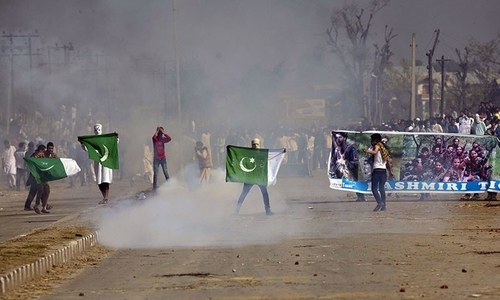NEW DELHI: Amnesty International India has temporarily closed its offices and postponed events aimed at raising awareness of rights abuses over safety concerns for its staff after the charity was accused of sedition by protesters, a spokeswoman said on Wednesday.
Political activists held demonstrations against the rights group on Tuesday and Wednesday, accusing it of inciting hatred against the state during an event it hosted on abuses by Indian security forces in the troubled Kashmir region.
Police said they were investigating if “anti-India” slogans were raised at the event after receiving a complaint from the right-wing student organisation, Akhil Bharatiya Vidyarthi Parishad, which has ties to the ruling Bharitya Janata Party.
Amnesty said the allegations against the organisation were unsubstantiated, but admitted that slogans calling for Kashmir's independence were chanted by some people attending Saturday's seminar in the southern city of Bengaluru.
“The allegations mentioned in the complaint are without any basis. The event was an open door event and people were coming and going. No staff members were involved,” said Himanshi Matta, Amnesty International India's spokeswoman in India.
“They are preventing the families of victims of human rights violations in Jammu and Kashmir from having their stories heard. And preventing civil society organisations from enabling these families to exercise their constitutional right to justice.”
Following protests by hundreds of right-wing activists in Bengaluru on Tuesday and in Delhi on Wednesday, Matta said the charity had decided to temporarily close its main office in the city, as well smaller ones in Pune, New Delhi and Chennai.
The seminar - aimed at raising awareness over the lack of justice for families of victims in Kashmir — was planned to take place in Mumbai and New Delhi next week, but has been postponed due to security concerns for the families and staff, she added.
Rights groups have for years accused Indian forces battling a separatist insurgency in Kashmir and parts of northeast India of violating civilian rights through a controversial law which gives them sweeping powers to search, arrest or shoot people.
Authorities and the armed forces deny the charges, saying the law — the Armed Forces Special Powers Act — is essential to root out militants.
Video footage of the event in Bengaluru which was recorded by Amnesty has been handed over to the police, and is being studied by forensic investigators, said a police official, who declined to be named.
The investigation comes as India-held Kashmir experiences its worst unrest in six years after security forces last month killed a young separatist commander who was idolized by some youth, provoking an outpouring of anger.
At least 64 people — civilians and security forces — have been killed in last 40 days in violent street protests, and a strict curfew has been imposed on residents.












































